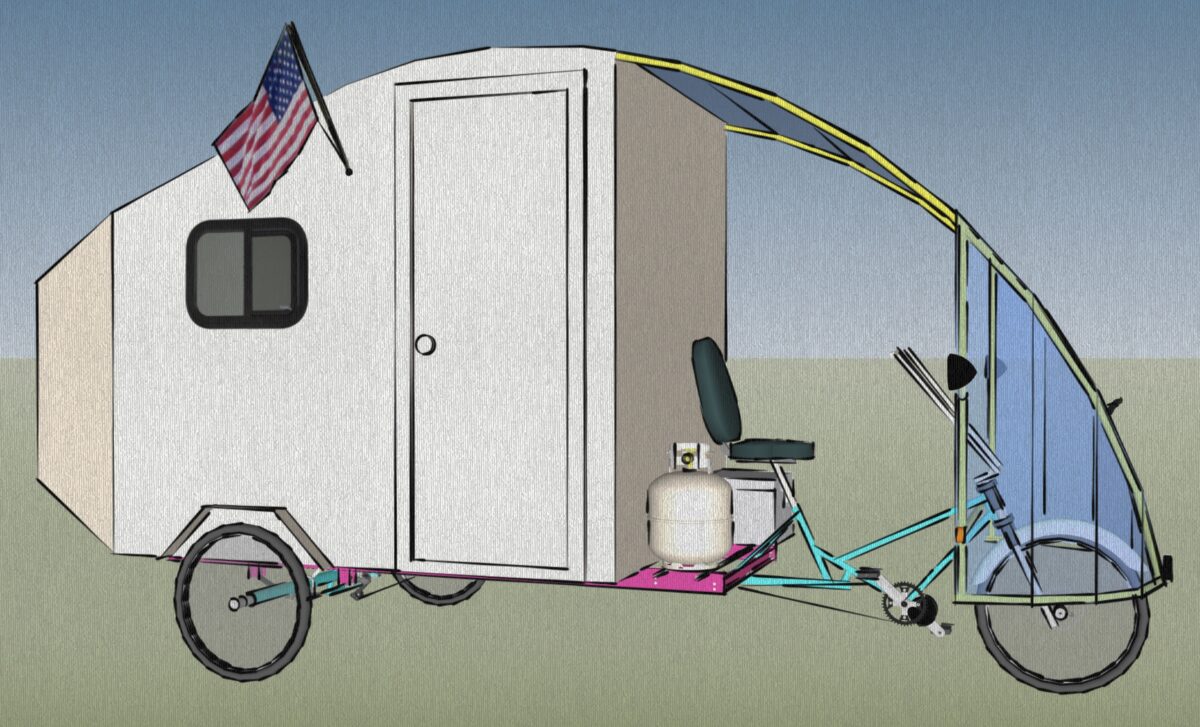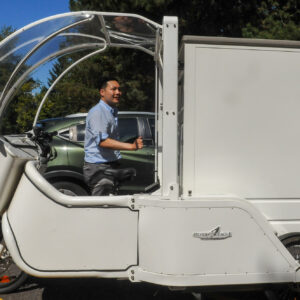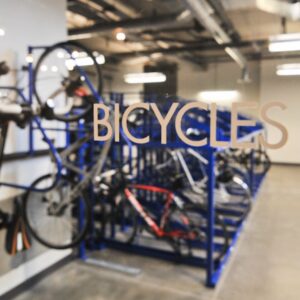
(Graphic: POD the People, based on input from James Fritz)
What if there was a form of shelter that was much less expensive than housing and more private, comfortable and mobile than living on the street?
“Our intent is to develop an ‘over-the-grid’ community of zoning ninjas inhabiting a new type of mobile home.”
Portland nonprofit POD the People thinks they have a solution that will empower lower-income people and, “Make mobile micro-housing available to all.” “Our intent is to develop an ‘over-the-grid’ community of zoning ninjas inhabiting a new type of mobile home,” reads the group’s website.
POD is short for Portland Opportunity Dwelling™, a concept based on a three-wheeled, electric motor-home that aims to be legally classified as a light electric vehicle/bicycle.
POD the People Director Jeffrey Hood recently got in touch with BikePortland because he and his team are ready to build prototype and is looking for a contractor. If you or your company has experience, “producing custom assemblies for bicycles and pedal-operated vehicles” POD the People wants to hear from you. They’ve issued a request for quotations (RFQ) that will stay open until February 19th.
Advertisement
Hood is a Reed College graduate with a masters in urban planning from UC Berkeley. He’s also a Certified Adult Mental Health Peer Support Specialist who previously worked for the San Francisco County Transportation Authority where he created a simulation model for counting bike traffic via a mobile app. His idea for the POD came during a road trip in the summer of 2016. That’s when he met artist Kathryn Lowry and community organizer Tom Truong. “Tom wanted to try living in the ‘nomad bicycle camper’ that he saw in a video by Paul Elkins,” Hood shared in an email to BikePortland. “When we returned to Portland, we built the camper from Paul’s plans.”
Truong lived in the trailer for a few months. But a harsh winter in 2017 forced the need for a heating solution, which led to fire safety concerns, which took Truong and Hood down the path that ultimately led to POD the People.
The organization is currently led by Hood, Rachel Kessler, and Michael McCloskey. Hood says they’re in need of volunteers to help on many facets of the project. Once they have a buildable design, the distribution model will be based on collaborative partnerships. Eligible customers (the focus is on people under the poverty line) will be given the option to build a POD themselves. Depending on how much money a person has, they might be able to completely offset the cost by building their own POD.
Advertisement
“This arrangement will not only make PODs more accessible to those in need,” Hood says. “Personally-invested participants will also develop vocational skills and experience greater success in maintaining their PODs.”
The legality of a lightweight, human-electric-powered vehicle that is intended to be used as housing is still a bit murky. Hood said it’s “An evolving area of the law” but he is confident the ultimate design will not run afoul of any laws.
“Regardless of how the specifics shake out,” Hood added. “We will remain steadfast in our purpose — to empower the poor by making mobile micro-housing available to all.”

(Photo: Jonathan Maus/BikePortland)
The POD design reminds us of the infamous “motorhome” bike built by Brian Campbell. Campbell was a nomadic and enigmatic character who first blew into Portland on his amazing bicycle house in 2006. A year later the community rallied around Campbell to help him rebuild his vehicle. He stayed around Portland a few more years and at one point hoped to mass-produce and sell his vehicle to others.
POD the People is taking a much more formal approach. And given the urgent need for innovative shelter and housing solutions in Portland, it will be interesting to see how this evolves.
If you’d like to learn more, donate, or volunteer to make PODs a reality, check out PODthePeople.org.
— Jonathan Maus: (503) 706-8804, @jonathan_maus on Twitter and jonathan@bikeportland.org
— Get our headlines delivered to your inbox.
— Support this independent community media outlet with a one-time contribution or monthly subscription.







Thanks for reading.
BikePortland has served this community with independent community journalism since 2005. We rely on subscriptions from readers like you to survive. Your financial support is vital in keeping this valuable resource alive and well.
Please subscribe today to strengthen and expand our work.
Looks interesting.
Can you clarify some terminology from the article? What do “over-the-grid” and “zoning ninjas” refer to in this context?
I assume that it means that zoning laws will not apply to them, but I am curious as well.
Just drive down NE 33rd near the airport if you want to see Zoning Ninjas.
If they were truly Ninjas, we wouldn’t even see them at all.
What a novel idea! Kudos to Jeffrey and his team.
Jonathan, I included a reference link to your story here. Pls let me know if you’d like me to remove the reference or modify my description.
I see I wasn’t logged into my BP account yesterday. When I saw Jeffrey’s concept illustration, I thought it resembled these trailers, albeit it would be smaller, lighter and less expensive.
To reduce the cost even further, maybe some of the older BikeTown bicycles could be repurposed? And maybe Jeffrey could get some of the heavy truck and/or RV manufacturers in Oregon to help out? Just spitballing.
Pod people would still be living on the streets with the same lack of hygienic facilities and the same lack of waste management as they now have. The difference is that rather than a cloth tent the have a mobile hard shell “pod” that would likely cost around $1500 to $2500 (depending on”amenities”). Rather than tents on the sidewalk we would have pods in the bike lanes or on MUPs. Why we can’t repurpose buildings into shelters defies logic
And you’ll still be dealing with trash and piles of bike parts.
I have wondered the same thing. Years ago there were a lot of cheap hotel type living in downtown. Now all the low income housing looks high end and costs a lot to build. Why are we not just building cheap dorm style buildings with common bathrooms/showers and common cooking areas. It would be a lot less to build if you don’t have to plumb every room. I lived like that for years when I went to school. It is nicer to have a private bathroom and shower but it would seem like it is better to house as many people as possible.
The reasons are many, but they all revolve around $
Of course I bet we could think of other reasons why the county and city are so resistant to “easy” solutions that don’t require a huge amount of tax money. Campaign contributions anyone??
I worked on the Henry building downtown. Six story repurposed for low income. It was just that, single rooms with shared facilities. The renovation was a complete seismic upgrade. Project cost $43 million. When you build things, it has to be safe. Safe is expensive.
However, there’s a 19 unit apartment complex for sale around the corner from me for $3.3 million.
I’m curious. Do you support transitional housing projects such as the Kenton Women’s Village or the pods downtown (my earlier link)?
Thank you Granpa
So “zoning ninjas” are essentially scofflaws. GREAT /s an enterprise intended to further enable noncompliance with civic ordinances.
“In Jersey everything’s legal, as long as you don’t get caught.”
I think a majority of people, from all walks of life, break laws on a daily basis. Essentially becoming scofflaws. A relevant example is a homeowner who makes additions without permits.
How strong is that soap box?
I am not at all clear why or how Hood’s academic background in any way suggests that reconfiguring today’s tent-and-shopping-cart home somehow reinforces the idea of a city (urb). It seems the opposite: fragile, temporary, and nomadic. It would foster a solitary, unattached lifestyle rather than one of long relationships with fellow citizens and durable places. Promoting community and long-term stability is a goal beyond worthy – essential even – but I don’t see how this contraption leads in that direction.
Well, Hood is an urban planner and mental health expert. Houselessness is squarely in the Venn Diagram of those topics.
in my work you can find two experts to say things that are often opposite to each other.
Not untrue. Being an expert though, entitles them to pontificate.
I strongly oppose metro homeless services funds, and I strongly oppose paying for toys like this with any grants.
I guess the intent is good, but I just see these ending up in a bike chopshop scrap pile too.
Despite what I said in my original (trial balloon) post, I agree.
On 12/18/2015, when I still had the stomach for Twitter and began to see the need for temporary homeless shelters on my walks throughout the metro region, I tweeted: “Intriguing design. A Nestable Design Approach to Temporary Shelters https://t.co/3Q2sYUxOsb via Core77”
Six years later, I still think these could be a viable alternative.
Although this article has likely expired, I think Argyle Gardens in Portland’s Kenton neighborhood might serve as another transitional housing model worth considering. At this point in time, I think any-and-all models should be on the table.
The following excerpt is from the article A Colorful Portland Prototype Reinvents the SRO.
“Opened in April of this year, the colorful Argyle Gardens project was designed by Portland firm Holst Architecture to help fill the gap between homeless shelters and traditional apartments. After receiving a grant from the nonprofit Meyer Memorial Trust, the architects and client sought to develop a flexible design that reimagines traditional single-room-occupancy affordable housing, which has slowly disappeared across America.”
Updated for the record. [Seven] years later, I still think these could be a viable alternative.
Absurd
Why does it need to be mobile? a mobile solution seems to be simply kicking the problem down the road. Set up a fields full or concrete impregnated canvas dwellings and don’t allow camping anywhere else.
Concrete impregnated tents are assembled by pulling out of the back of truck, inflating with a leaf blower and then spraying with water. They are Durable, fireproof, safe, inexpensive. 1 window; 1 lockable door. done.
Consider the statement “and dont allow camping anywhere else”. Who decides theyre enough demigod to enforce such a ridiculous idea ?